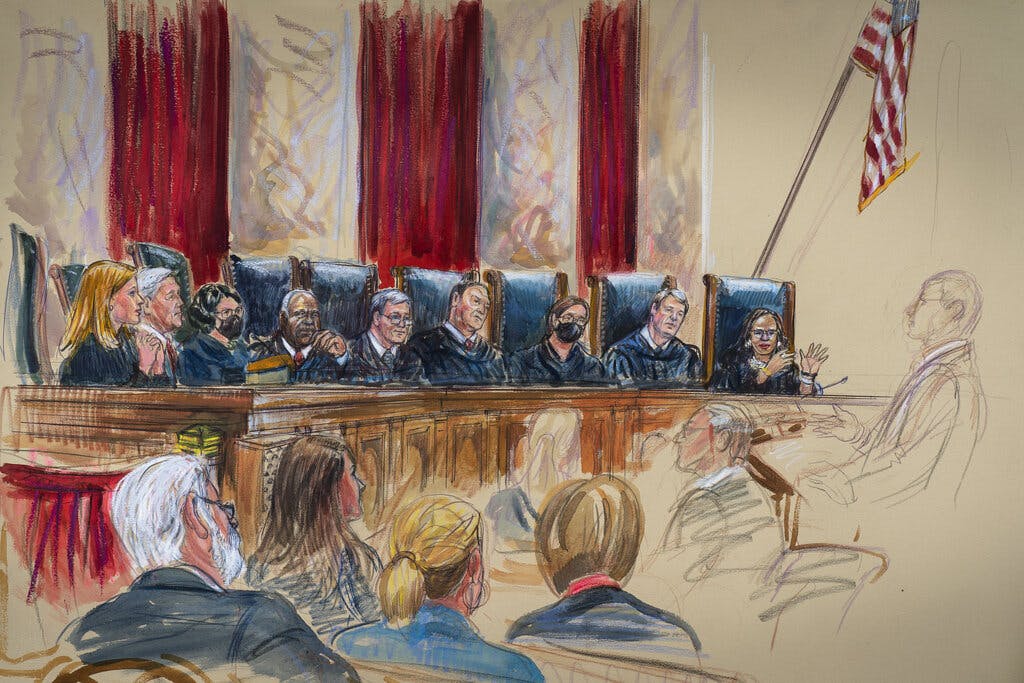Amid Mentions of J-Date and Ashley Madison, Justices Weigh Gay Rights Case
In ‘Masterpiece’ redux, the high court is set to draw free speech limits.

Oral arguments that pitted a freelance website designer wielding the First Amendment against the state of Colorado, armed with its anti-discrimination laws, have now been heard, and it will be up to the justices to decide a case that could rewrite laws nationwide. The court’s conservative cohort appears set to back the designer.
303 Creative v. Elenis is the story of Lori Smith, who sued the Centennial State. The maneuver was meant to block enforcement of the Colorado Anti-Discrimination Act, its public-accomodation proviso. Ms. Smith pressed her rights under both the free speech and free exercise of religion clauses of the First Amendment.
Ms. Smith lost in front of the riders of the 10th Circuit of the United States Court of Appeals, but the high court agreed to hear her case, albeit solely on free speech grounds. In declining to address the religion question, they keep intact Employment Division v. Smith, which held that an “otherwise valid” law that burdens religion is constitutional in absence of a “compelling” objection.
Ms. Smith argues that she would design materials for gay couples as long as they did not “express approval of the couple’s marriage,” a seal of approval her faith prevents her from providing. She maintains that her work is best understood as “pure speech” and that Colorado’s law unconstitutionally burdens it.
Colorado takes the position that CADA regulates not speech, but sales. In other words, it requires her to make whatever services she provides available to all who seek them. The state compares her business to a “common-law tradition that predates the Founding” requiring hotels and restaurants to be made available to all.
The justices spent hours on Monday probing the case’s central question — “whether applying a public-accommodation law to compel an artist to speak or stay silent violates the free speech clause of the First Amendment.”
During oral arguments, one hypothetical, from an amicus brief submitted by the Jewish Coalition for Religious Liberty, caught Justice Samuel Alito’s eye. It wondered whether a Jewish web designer would be required to create a website for the marriage of a Jewish man to a non-Jewish woman if the designer felt intermarriage to be “an existential threat to the future of Judaism.”
The brief then asked whether that same developer, notwithstanding the Seventh Commandment, which was brought down from Sinai and forbids adultery, could be forced to take a headshot not for J-Date, the Jewish dating service, but for Ashley Madison, a site whose tagline is, “Life is short, have an affair.” Would the Constitution require the developer to participate in this “shonda”?
Justice Sonia Sotomayor appeared skeptical of the claims of Ms. Smith’s lawyer, Kristin Waggoner of the Alliance Defending Freedom. Justice Sotomayor challenged Ms. Waggoner to show how an invitation functioned as an “endorsement of the marriage.” She insisted that “it’s the couple’s story” not “your story,” referring to Ms. Smith.
Mrs. Waggoner replied, “Book authors may be writing about other’s stories but it is still their speech,” meaning that the creators are inextricably linked to their creations. She likewise argued that the Pulitzer Prize is awarded not to a photograph’s subject, but to the photographer.
Justice Clarence Thomas challenged Colorado’s solicitor general, Eric Olson, by arguing that Ms. Smith’s website is “not a hotel.” Nor is it a “restaurant” or a “train.” In other words, regulating speech via public accommodation law is inappropriate. This appeared to align with the court’s conservative justices, who hold a 6-3 majority.
In the words of Justice Neal Gorsuch, the case is not so much the “who” of who is denied service, but the “what;” the content of the message. Justice Amy Coney Barrett appeared to track that analysis, noting that the designer’s “strongest ground” was the reality that her work is “custom.”
303 Creative v. Elenis follows on Masterpiece Cakeshop v. Colorado Civil Rights Commission, a 2018 suit that featured a baker rather than a designer but turned on much the same set of facts. The court handed the baker a narrow victory, finding that several members of the Colorado agency that ruled on the question had made remarks bigotted against religion.

